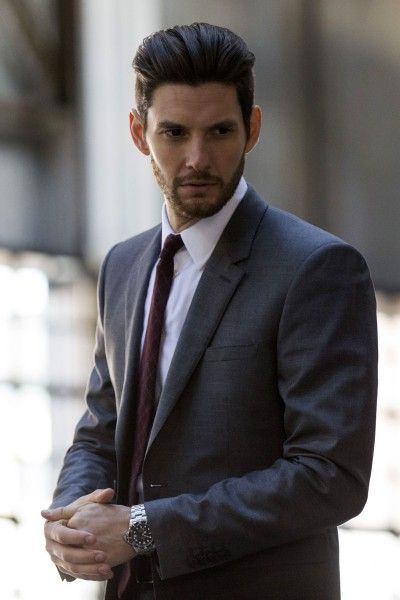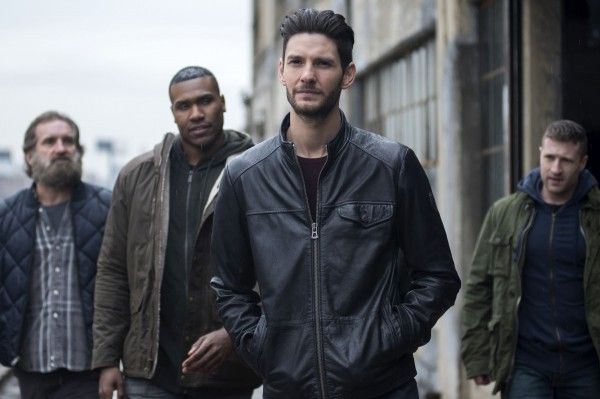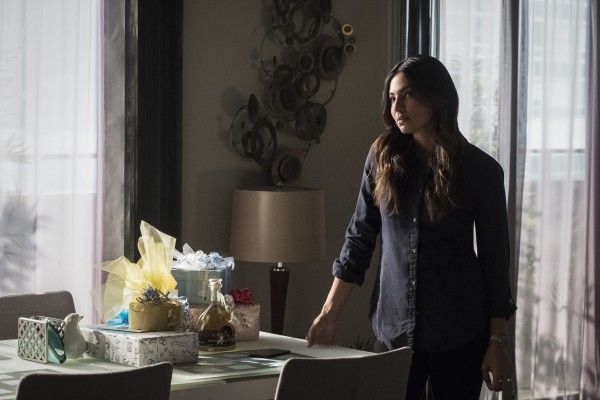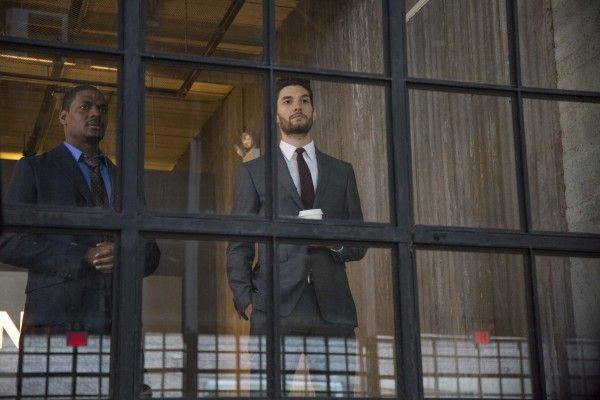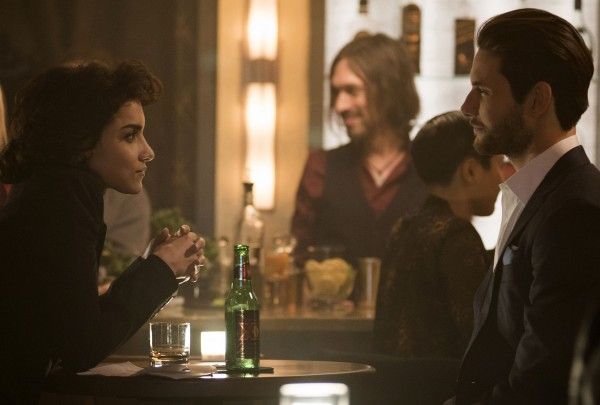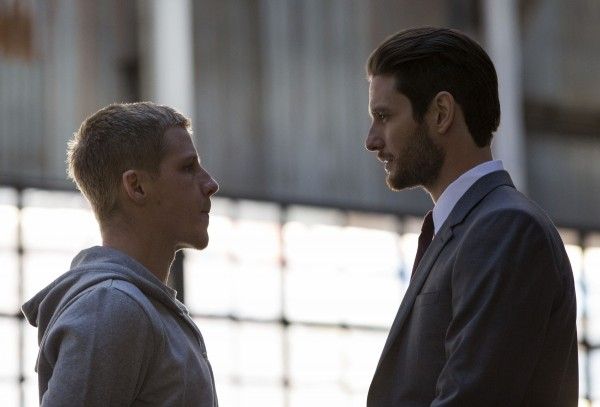The Punisher season two picks up right where the blood-soaked first season quietly left off, with human war machine Frank Castle (Jon Bernthal) suddenly finding himself without a war to fight and all out of people to shotgun in the face as vengeance for his family's death. Earlier this year, Netflix invited Collider and a few other journalists to the show's Brooklyn set to get a look at a sophomore season that is—if you can believe it—darker, more violent, and more bullet-riddled than before. In addition to getting a glimpse of Frank's junkyard trailer hideout he shares with a new teenage sidekick of sorts, Amy (Giorgia Whigham), we got the chance to speak to Bernthal, Ben Barnes, Amber Rose Revah, Jason R. Moore, Josh Stewart—who plays this season's creepy antagonist, John Pilgrim—who all confirmed that Frank Castle will never be able to hang up the old black-and-white skull vest for long.
In the following roundtable interview, Ben Barnes and Floriana Lima (Supergirl)—who plays Billy Russo's psychotherapist, Krista—discuss Billy's recovery from his devastating fight with Frank Castle, piecing his memories (and face) back together, the threat Billy poses in season 2, and much more.
Question: So, tell us about Billy’s face.
BEN BARNES: The repercussions of the fight at the end of the first season are very much marked on his face. They tried quite carefully to figure out all the specific injuries from exactly what happened to him designated to leave a scar. He gets shot in the cheek, a ricochet into the cheek, so there’s a bullet wound hole in the cheek. We hear the doctor saying he’s undergone many surgeries, obviously for the stab wound in his stomach but also on his face. He’s had a plastic surgeon try and fix him. With all these stories, they’ve gone for a more grounded version of what that imagery would be. But there’s also a couple interesting facets of that, one of them which is obviously, we’re talking about a deeply narcissistic character in the first season. His mask of appeal, in terms of doing his hair and his nice suits and all that stuff, has been stripped away from him. It’s about what he sees when he looks in the mirror as opposed to what others see. They didn’t necessarily want it to be a horror show, it’s more internal. We don’t refer to the character, in the series, as Jigsaw. But he very much has a jigsaw puzzle in his brain. It’s not necessarily about his face, it’s about the psychological, which is how they try and approach everything. Particularly this season, even more than last season. It’s about what’s in his head.
How does the fractured-ness of his mind manifest itself?
BARNES: It’s not just about the physical. He’s had his head very much traumatized, in the same way that veterans recieve these head traumas. And psychological trauma as well. So he’s dealing with those things very much in a similar way that veterans deal with coming back from war. That’s what he sort of believes he’s gone through. He’s got brain damage. Severe issues with his memory. I won’t go into specifically what he can and cannot remember, but he’s trying to piece together what happened to him and who he is. There is the metaphor at one point that his brain is the jigsaw that he’s trying put the pieces back together of. It’s not necessarily about the lines joining up on his face, which I think is a much more interesting thing. After reading the first few episodes, I saw where it was going and that was something that was really exciting to me. Because it was almost like playing a different character from the first season without putting a cape and mask on and saying, “I’m bad now.” It’s more so literally waking up and only knowing some things about yourself. That gives him this chance to really reinvent who he is but he has no control over what he’s thinking or feeling. That was interesting, because as I said this is a character whose core drive was to succeed; narcissism, I’m going to put across my most charismatic, attractive qualities to the forefront and hope that people respond to them in the way they always have. Hope that people want to do things for me and with me because of what I put out there. That is gone for him. He doesn’t believe he’s not that person anymore. So I came in on the first day and said, “Right, shave my head, then.”
Did you interact with veterans at all to enhance your performance?
BARNES: We did have some veterans in the first season who we stayed in contact with so we had them available to us to ask questions to. There’s definitely something that, obviously with having Flo playing Krista, who is my psychotherapist in the story, that was the interesting thing where we looked at some interesting things that I know I’m not allowed to talk about. But there are some specific sort of veteran stuff that I talked about with psychotherapists and psychiatrists and read a lot about to learn why we were doing this thing. It was cool, too, to have it grounded in something very specific and modern, too, in terms of how we encourage veterans to talk about their experiences now.
Who is Krista, what should we know about her for season 2?
FLORIANA LIMA: Krista is Billy’s psychotherapist. She’s worked with veterans before, she’s dealt with PTSD. She comes in the second episode, we see her with Billy, who she’s been working with for months. She’s been coaching him through all the things that Ben just mentioned, all of his putting together of puzzles. She has specific techniques and some insights into how to pull out everything he is struggling with.
The costume designer told us about [Krista’s] costume being very closed and covered up. How does that inform your character?
LIMA: That was definitely something that Lorraine [Calvert] and I talked about and what we really wanted to do. I pull from my wardrobe a lot, usually. I did feel like she was very put together. Very...not so much covered up but just professional. She has a reason why she wants to be that way. Portrayed that way.
Coming from a show like Supergirl, can you tell us about the differences between that show and this show beyond just the differences between network television and streaming?
BARNES: It’s better here, right?
LIMA: Yeah, totally. [laughs] This seems very real to me here. Of course, Supergirl there’s lots of people with special powers and aliens and stuff going on. To me, it’s more of a make-believe with me playing my character, Maggie Sawyer. On this show, it seems like we’re telling a story about how people live. Veterans. I’m dealing with veterans, this is based in reality. It’s definitely a different world. I love it. I don’t want to say one is better than the other, they’re so different.
As a psychotherapist, what is Krista’s take on Frank Castle?
LIMA: She just learns about Frank through Billy, so she’s jotting down every little bit and piecing together her own opinion. I guess we will see what she thinks this season.
At any point does she begin to suspect there is a villain inside of Billy?
LIMA: I think she deals with a lot of different types of personalities. In the beginning, we’re seeing her just learning about Billy, I don’t think she’s coming up with an opinion. She’s thinking most of it is PTSD. I don’t think she’s judging in any way. She’s just thinking it’s another patient, he has his own trauma, his own mess to deal with. She’s helping him with the puzzle, I guess.
What threat does Billy pose to Frank Castle this season?
BARNES: What was really interesting to me was to see, in the first season, you’re presented with these two men and you know they have had a similar set of experiences. Billy’s trauma very early on in life, with his abandonment by his mother and narcissism a history of abuse as a child, has framed who he was. Then he’s finally found this home in the military but his ambition and greed and lack of moral compass have got the better of him and he made that decision to allow that to supersede his love for his best friend and that military family that he found. He doesn’t see the mistake in that, and that, to me, is the one area of his psychology which is a black hole. It’s missing, that’s what separates him from Frank, in terms of that true north he doesn’t seem to have on his moral map. It’s interesting when you’re presented with these two people with similar experiences and you see how different they behave given specific sets of circumstances.
The second season, we’re toying with his memory. He sees himself slightly differently. As we go through the series, what’s fascinating to me is seeing now just how different they are, but how similar they are, given other sets of circumstances. As we get toward the end of the season, people are starting to point out just how similar they could be under different circumstances. Because it’s about people’s perspectives of things. Krista as a medical professional is judging the situation based on what she’s heard. Billy is judging the world based on what he’s woken up to. Frank is judging the world mainly looking back on his past and the trauma that’s happened to him. What’s happened to him, he’s looking at it very myopically through that lense of, “I’ve lost my family.” That’s his driving force. Curtis is looking at it through his drive to help people. This season is a lot about where everyone’s true north is. At the end of the day, what are my limits? What drives me? What is my purpose? Dealing with the past and trauma is very much what season one was about, particularly in terms of veterans. Dealing with what’s ahead of me, what is there for me, what ought I be doing with my life, is more what season 2 is about.
It seems like we’re going to get a very different side of your character in season 2, which was also the case with your character in Westworld. Is it exciting to you to play a character where it’s like, “You thought you knew who this person is…”
BARNES: I really do feel very lucky in that regard. People love to get to know characters and feel like they really know them. They’re comforted by the fact they could probably predict how they’re going to act in certain situations. If Frank is in a room and there’s a weapon in the room, he’s going to win somehow. That’s exciting but comforting to know. Characters don’t often get a believable rebirth. The thing about Westworld, with the timelines, in the first season of Westworld you only saw the Logan character in a very specific scenario. How someone behaves in a theme park which they own with somebody they don’t really like is very different to how they are when you strip that away. It’s all about masks. We all do it all the time, try and present this version of ourselves. That’s what Instagram is. Trying to present this version of ourselves to the world when actually at home it might be something completely different. That’s what Westworld is. [Punisher] is something slightly different. Westworld it’s about stripping away the bullshit and seeing what is at Logan’s core, which is someone incredibly depressed and lonely and unloved, which is why he acts the way he does. In this, this is something different, this is a clean slate. But it’s also a little bit about the inevitably of what we will always be drawn back to, because people are who they are. Or are they? That’s the question.
But it’s exciting. There wasn’t much vulnerability to Billy Russo the first season, it was a lot of Burberry and hair gel first, human being second. Then in this, all that’s gone. He’s in a gown and he doesn’t want to look at himself. He doesn’t know if there’s anyone in the world who will understand, and I think that’s a beautifully vulnerable position to be in. I noticed that in the first season of Daredevil with Vincent D’Onofrio’s character, the first time you see he’s not raging and breaking something, it’s like falling deeply and sweetly in love for this character. Obviously, Marvel is going to be doing different things with different seasons so we don’t want to repeat those things. First season, with Billy we did something that hadn’t quite been done, which was ambiguity as to whether he’s a villain or not and then the reveal that he actually is quite a bad guy. Now we get to see that alternate side of him, which is maybe he’s not all bad.
What part of yourself do you bring to playing Billy Russo?
BARNES: There are two interesting challenges when you’re playing any character. One, how much of myself can I bring to these moments? What do I really and truly understand about this moment, saying this thing to this person? How do I bring authenticity to it? And then there’s the other side, which is like, I have absolutely no comprehension of what it would like to be in this situation and it’s completely hypothetical to me. And how fun to try and understand what that would feel like. Both of those things are really interesting to me. My mother is a psychotherapist, my father is a professor of schizophrenia, so I’ve used them an awful lot this season. The showrunners actually talked to them a little bit. There are moments when Krista and Billy are talking when it’s a man talking to a woman, and those moments I’m obviously drawing on my experience having conversations in life, and trying to make them authentic in that way. There are other things which Billy does in this show that I cannot begin to understand what pushes a person to that place. Wouldn’t understand it or accept, I certainly would judge it if they did do those things. So finding a way into that is a different kind of challenge. You go about it by relating it to the closest thing you have done.
Your New York accent as Billy, did you listen to anyone in particular to nail that?
BARNES: I don’t care if I get in trouble for this, I will tell you a stage direction from episode 2. It says “Billy’s accent sounds even rougher, more akin to his Bensonhurst roots.” So it’s actually a little different in the second season. He’s woken up as the kid he was. And I was like, “Ehh, I don’t know about that.” Then I remembered this video I saw, my parents were putting together a 30th birthday for my brother, and there was video of him at like age two or three, and I was five or six. I think it’s my birthday party, and I’m like [heavy London accent], “Books? I don’t want bloody books for me birthday.” After that, I went to a different school and came out sounding like this. It was just so funny to me that I had no idea that’s what I sounded like when I was little. So that happens.
But I did work with a coach on the first season, and the second season a little bit. But yeah, the last thing you want is to be shooting a show in New York where you sound like, “Are you from London?"


